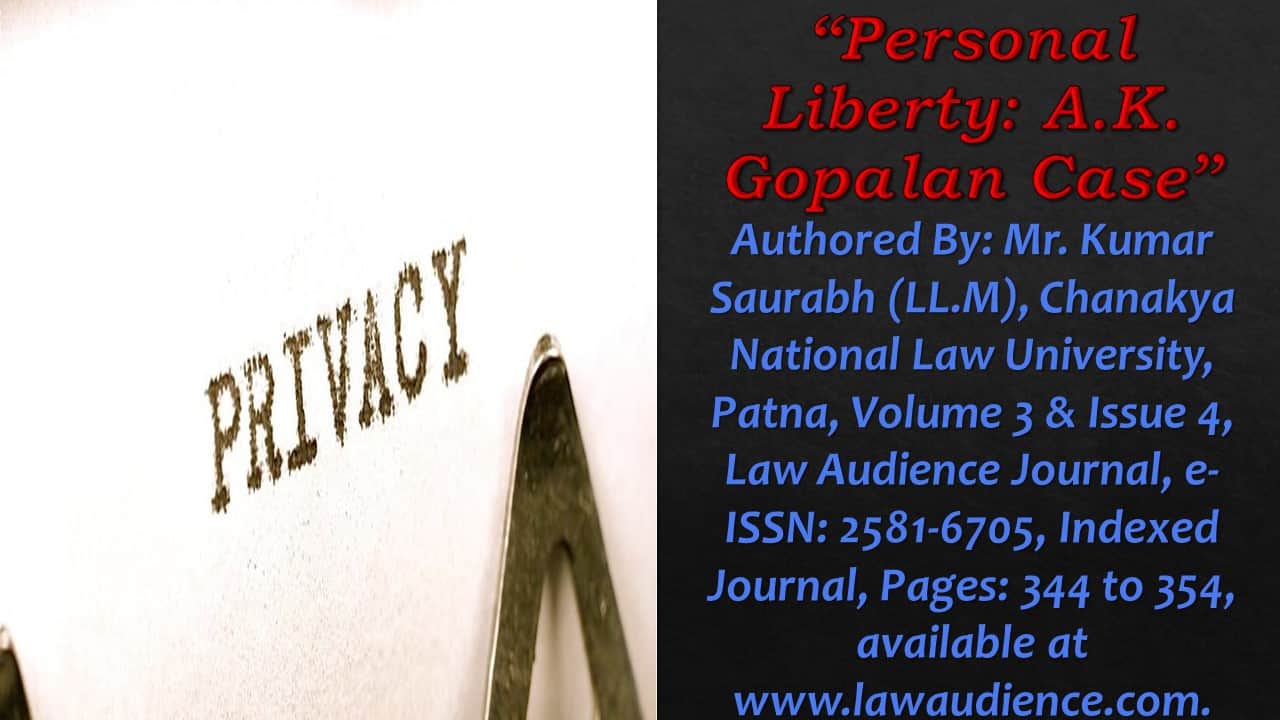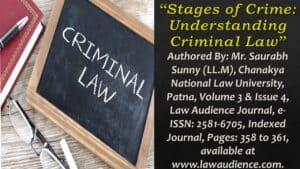Click here to download the full paper (PDF)
Authored By: Mr. Kumar Saurabh (LL.M), Chanakya National Law University, Patna,
Click here for Copyright Policy.
I. INTRODUCTION:
Article 21 reads as:
“No person shall be deprived of his life or personal liberty except according to a procedure established by law.”
According to Bhagwati, J., Article 21 “embodies a constitutional value of supreme importance in a democratic society.” Iyer, J., has characterized Article 21 as “the procedural magna carta protective of life and liberty. This right has been held to be the heart of the Constitution, the most organic and progressive provision in our living constitution, the foundation of our laws.
Article 21 can only be claimed when a person is deprived of his “life” or “personal liberty” by the “State” as defined in Article 12. Violation of the right by private individuals is not within the preview of Article 21. Article 21 secures two rights:
- Right to life
- Right to personal liberty
The Article prohibits the deprivation of the above rights except according to a procedure established by law. Article 21 corresponds to the Magna Carta of 1215, the Fifth Amendment to the American Constitution, Article 40(4) of the Constitution of Eire 1937, and Article XXXI of the Constitution of Japan, 1946. Article 21 applies to natural persons. The right is available to every person, citizen or alien. Thus, even a foreigner can claim this right. It, however, does not entitle a foreigner the right to reside and settle in India, as mentioned in Article 19 (1) (e).
II. CONCEPT OF PERSONAL LIBERTY AND PROVISIONS:
The Liberty of the person is one of the oldest concepts to be protected by national courts. As long as 1215, the English Magna Carta provided that, no freeman shall be taken or imprisoned… but… by the law of the land. The Supreme Court has held that even lawful imprisonment does not spell farewell to all fundamental rights. A prisoner retains all the rights enjoyed by a free citizen except only those ‘necessarily’ lost as an incident of imprisonment.
II.I RIGHT TO PRIVACY:
As per Black’s Law Dictionary, privacy means “right to be let alone; the right of a person to be free from unwarranted publicity; and the right to live without unwarranted interference by the public in matters with which the public is not necessarily concerned”.
Although not specifically referenced in the Constitution, the right to privacy is considered a ‘penumbral right’ under the Constitution, i.e., a right that has been declared by the Supreme Court as integral to the fundamental right to life and liberty. Right to privacy has been culled by Supreme Court from Art. 21 and several other provisions of the constitution read with the Directive Principles of State Policy. Although no single statute confers a crosscutting ‘horizontal’ right to privacy; various statutes contain provisions that either implicitly or explicitly preserve this right[1]
For the first time in Kharak Singh vs. State of U.P.[2] question whether the right to privacy could be implied from the existing fundamental rights such as Art. 19(1)(d), 19(1)(e) and 21, came before the court. “Surveillance” under Chapter XX of the U.P. Police Regulations constituted an infringement of any of the fundamental rights guaranteed by Part III of the Constitution. Regulation 236(b), which permitted surveillance by “domiciliary visits at night”, was held to be in violation of Article 21.
In Govind vs. State of Madhya Pradesh[3], The Supreme Court took a more elaborate appraisal of the right to privacy. In this case, the court was evaluating the constitutional validity of Regulations 855 and 856 of the Madhya Pradesh Police Regulations, which provided for police surveillance of habitual offenders including domiciliary visits and picketing of the suspects.
II.II DISCLOSURE OF DREADFUL DISEASES:
In Mr. X vs. Hospital Z[4], the question before the Supreme Court was whether the disclosure by the doctor that his patient, who was to get married had tested HIV positive, would be violative of the patient’s right to privacy. The Supreme Court ruled that the right to privacy was not absolute and might be lawfully restricted for the prevention of crime, disorder or protection of health or morals or protection of rights and freedom of others.
II.III RIGHT TO PRIVACY AND SUBJECTING A PERSON TO MEDICAL TESTS:
It is well settled that the right to privacy is not treated as absolute and is subject to such action as may be lawfully taken for the preventive of crimes or disorder or protection of health or morals or protections of rights and freedom of others. In case there is conflict between fundamental rights of two parties that which advances public morality would prevail.
A three-judge bench in case of Sharda vs. Dharmpal[5], ruled that a matrimonial court had the power to direct the parties to divorce proceedings, to undergo a medical examination. a direction issued for this could not be held to the violative of one’s right to privacy but court however said that for this there must be a sufficient material .
II.IV RIGHT TO PRIVACY: WOMAN’S RIGHT TO MAKE REPRODUCTIVE CHOICES:
A woman’s right to make reproductive choices includes the woman’s right to refuse participation in sexual activity or alternatively the insistence on use of contraceptive methods such as undergoing sterilization procedures woman’s entitlement to carry a pregnancy to its full term, to give birth and subsequently raise children.
II.V RIGHT TO GO ABROAD:
In Satwant Singh Sawhney vs. Assistant Passport Officer, New Delhi[6], the Supreme Court has included Right to travel abroad contained in by the expression “personal liberty” within the meaning of Article 21.
In Maneka Gandhi vs. Union of India[7], validity of Sec. 10(3)(c) of the passport Act 1967, which empowered government to impound the passport of a person, in the interest of general public was challenged before the seven-judge Bench of the Supreme Court. It was contended that, right to travel abroad being a part of right to “personal liberty” the impugned section didn’t prescribe any procedure to deprive her of her liberty and hence it was violative of Art. 21.
The court held that the procedure contemplated must stand the test of reasonableness in order to conform to Art.21 other fundamental rights. It was further held that as the right to travel abroad falls under Art. 21, natural justice must be applied while exercising the power of impounding passport under the Passport Act.
III. ANALYSIS OF A. K. GOPALAN CASE:
Article 21 lays down that no person shall be deprived of his life and personal liberty except according to the procedure established by law. It was this procedure established by law that was first questioned and interpreted by the Supreme Court of India in the case of A.K. Gopalan vs. State of Madras[8].
In the case of A.K. Gopalan vs. State of Madras[9], the validity of the Preventive Detection Act. 1950 was challenged. The main question was whether Art. 21 envisaged any procedure laid down by a law enacted by the legislature, or the procedure should be fair and reasonable. On behalf of the Appellant, an attempt was made to persuade the Supreme Court to hold that the courts can adjudicate upon the reasonableness of the Preventive Detection Act, 1950, or for that matter any law depriving a person hi personal liberty.
Three arguments were presented from the Appellant side and the arguments were:
- The word law in Art. 21 does not mean merely enacted law but incorporates principle of natural justice so that a law to deprive a person of his life or personal liberty cannot be valid unless it incorporates these principles laid down by it.
- The reasonableness of the law of preventive detention ought to be judged under Art. 19.
- The expression procedure established by law introduces into India the American concept of procedural due process which enables the Courts to see whether the law fulfils the requisite elements of a reasonable procedure.
Thus, in this case an attempt was made to win for a detenu better procedural safeguards than were available to him under the relevant detention law and Art. 22. But the attempt failed as the Supreme Court rejected all these arguments.
III.I RELATION BETWEEN ARTICLES 21, 22 AND 19:
The petitioners attempted to establish a link between Article 21, 22 and 19. The majority rejected this attempt of the petitioners and pointed out that the word personal liberty in Art. 21 in itself had a comprehensive content and, ordinarily, if left alone, would include not only freedom various freedoms guaranteed under Art. 19. However, Art. 19 must be held to deal with few specific freedoms mentioned. Similarly, Art. 21 should be held as excluding freedom dealt with in Art. 19. Thus, a law depriving personal liberty had to conform to Arts. 20 to 22 and not with Art. 19 and Art. 19 could be invoked only when a law directly attempted to control a right mentioned therein. This approach of the judiciary meant that Art. 21 and 19 are exclusive freedoms and one cannot overlap others ambit. On the other hand, the minority held that Art. 19(d) did control Arts. 21 and 22, and, therefore, the reasonableness of the Act should be justifiable under Art. 19(5).
III.II DUE PROCESS OF LAW:
The U.S. Constitution lays down inter alia that no person shall be deprived of his life, liberty or property, without due process of law.[10] It was contended in A.K. Gopalan vs. State of Madras[11], that the expression procedure established by law in Art. 21 was synonymous with the American concept procedural due process and, therefore, the reasonableness of any law affecting any person’s life or personal liberty, should be justiciable in order to assess whether the person affected was given a right of fair hearing. The Supreme Court, however, rejected this contention stating that absence of words due process of law is itself evident to prove difference in view of constitution-makers with that of American view.
However, Faiz Ali, J., disagreed with the majority view on this point as well. He interpreted the phrase procedure established by law in Art. 21 as implying procedural due process, meaning thereby that no person could be condemned unheard.
Thus, the Supreme Court ruling meant to deprive a person of his life or his personal liberty:
- There must be a law;
- It should law down a procedure; and
- The executive should follow this procedure while depriving a person of his life or personal liberty.
This judgement was highly criticized and K. Subba Rao, former Chief Justice of India, said about this case that, “The preponderance of view among the jurists is that it is wrongly decided. It has in effect destroyed one of the greatest of the fundamental rights, i.e., personal liberty.”[12] Fazl Ali, J., in his minority opinion has taken a much more liberal view of Art. 21. It took nearly three decades for his view to be vindicated in Maneka Gandhi v. Union of India.[13]
A.K. Gopalan vs. State of Madras[14], held the field for almost three decades, i.e., 1950 to 1977. This case settled two majors in points in relation to Art. 21. One, Arts. 19, 21 and 22 are mutually exclusive and independent of each other. Two, a law affecting life or personal liberty of a person could not be declared unconstitutional merely because it lacked natural justice or due process. The legislature was free to lay down any procedure for this purpose. As interpreted in A.K. Gopalan vs. State of Madras[15], Art. 21 provided no protection or immunity against competent legislative action. Art. 21 gave a carte blanche to a legislature to enact a law or to provide for arrest of a person without much procedural safeguards. It gave final say to the legislature to determine what was going to be procedure to curtail the personal liberty of a person in a given situation and what procedural safeguards he would enjoy.
III.III EFFECT ON ARTICLES 19, 21 AND 22:
In A.K. Gopalan vs. State of Madras[16] , the Supreme Court delinked Art. 19 from Arts. 21 and 22. This view led to anomalous decision at times. It was because of this view that the court refused to view the validity of detection of the Appellant under Preventive Detention Act, 1950 in the case of Ram Singh vs. Delhi[17]. Though, in course of time this view softened and in R.C. Cooper vs. Union of India[18], also popularly known as Bank Nationalization case, the Supreme Court applied Art. 19(1)(f)[19] to a law enacted under Art. 31(2), to view the validity of the law. Before this case these two articles were considered mutually exclusive of each other. This case had such an impact on the view of the Supreme Court regarding the mutually exclusiveness of fundamental rights that in the case of Sambhu Nath Sarkar vs. State of West Bengal[20], that the bench said that the majority view of Bank Nationalization[21] case impliedly held the majority view of A.K. Gopalan[22] case incorrect.
In Bannett Coleman Co. vs. Union of India[23], the Supreme Court declared that if a law affected freedom of speech, its reasonableness becomes assessable with reference to Art. 19(2) even though it was not enacted directly to control the freedom of speech. Therefore, the view of the Supreme Court in Gopalan case[24] that only laws which directly fall within the ambit of Art. 19 will be questioned for reasonableness under restrictions laid down in Art. 19 was no longer tenable. Finally, in the case of West Bengal vs. Ashok Dey[25], Supreme Court linked Arts. 19, 21 and 22. Other cases before Maneka Gandhi[26] case in which the Supreme Court linked Arts. 19, 21 and 22 under different situations are Haradhan Saha vs. State of West Bengal[27], John Martin vs. State of West Bengal[28] and P.L. Lakhanpal vs. Union of India[29].
IV. SUBSEQUENT CASES:
Maneka Gandhi vs. Union of India,[30] is a land mark case of the post emergency period. This case shows how liberal tendencies have influenced the Supreme Court in interpreting Fundamental Rights, particularly, Art. 21. This case showed that Art. 21 as interpreted in Gopalan[31] case could not play any role in providing any protection against any harsh law seeking to deprive a person of his life and personal liberty. In fact, this case has acted as a catalytic agent for the transformation of the judicial view on Art.21.
The court has reinterpreted Art.21 and practically overruled Gopalan case which can be regarded as highly creative judicial pronouncement on the part of Supreme Court. Since Maneka Gandhi case the Supreme Court has given Art.21, broader and broader interpretation so as to imply many more fundamental rights. In course of time, Art.21 has proved to be very fruitful source of rights of the people.
In Maneka Gandhi case, order under S. 10(3)(c) of the Passport Act which authorizes the passport authority to impound passport if it deems it necessary to do so in the interest of the sovereignty and integrity of India, security of India, friendly relations of India with any foreign country, or in the interest of general public was challenged. Maneka Gandhi’s passport was impounded by the Central Government under Passport Act in the interest of general public. She filed a writ petition challenging the order on the ground of violation of her fundamental rights under Art.21. One of the major grounds of challenge was that the order impounding the passport was null and void as it had been made without affording her an opportunity of being heard in her defence. The leading opinion in Maneka Gandhi case was pronounced by Justice Bhagwati. The Court reiterated the proposition that Art. 14, 19, and 21 are not mutually exclusive. This means that a law prescribing a procedure for depriving a person of ‘personal liberty’ has to meet the requirement of Art. 19. Also, the procedure established by law in Art. 21 must answer the requirement of Art.14 of the Constitution of India.
The expression personal liberty in Art.21 was given an expansive interpretation. The court emphasized that the expression personal liberty is of widest amplitude covering a variety of rights which go to constitute the personal liberty of man. The expression ought not to be read in a narrow and restricted sense so as to exclude those attributes of personal liberty which are specifically dealt with in Art. 19. The attempt of the Court should be to expand the reach and ambit of the fundamental rights rather than attenuate their meaning and content by the process of judicial construction, and hence right to travel abroad falls under Art. 21.
The most significant aspect of the case is the reinterpretation of the expression procedure established by law used in Art. 21. Art. 21 would no longer mean that law could prescribe some semblance of procedure, however arbitrary or fanciful, to deprive a person of his personal liberty. It now means that a procedure must satisfy certain requisites in the sense of being just, fair and reasonable. The process cannot be arbitrary, unfair or unreasonable. Thus, the procedure in art.21 must be right and just and fair and not arbitrary, fanciful and oppressive. The Court reached it decision by holding that Arts. 21, 19 and 14 are mutually inclusive. The reincarnation of Art.21 which Maneka Gandhi[32] case brought has been exerting a deep impact on contemporary constitutional jurisprudence. Maneka Gandhi case completely overrides the Gopalan’s view which had held the field for nearly three decades. Since Maneka Gandhi case, the Supreme Court has again underlined the theme that Arts. 14, 19 and 21 are not mutually exclusive, but they sustain, strengthen and nourish each other[33]. It has brought the Fundamental right of life and personal liberty into prominence which is now regarded as the heart Fundamental Rights.
In quite a few cases in the post-Maneka era, the Supreme Court has given content to the concept of procedural fairness in relation to personal liberty. By establishing a nexus between Art. 14, 19 and 21, it is now clearly established that the procedure contemplated by the Art. 21 must answer the test of reasonableness. Thus, Art. 21 emerged as the Indian version of the American concept of due process of law and have come to the source of many substantive rights and procedural safeguards to the people. The Court has observed that Art.21, though couched in negative language, confers the Fundamental Rights to life and personal liberty and has also deeply influenced the administration of criminal justice and prison administration. In a number of cases the Supreme Court has expounded several propositions with a view to humanize the administration of criminal justice in all its aspect. Art.21 has also proved to be a very productive source of several fundamental rights over and above those mentioned in the Constitution in Arts. 14 to 31.
V. CONCLUSION:
Personal liberty is an expression of widest amplitude and it includes various kinds of rights like Right to locomotion, right to travel abroad, Rights of a prisoner to speedy trail, Rights to defence before Advisory Board to take legal aid where the employer is represented by a lawyer. In the light of decisions of the Supreme Court, the word life and personal liberty are liberally interpreted and now being invoked almost as a residuary right. On account of expanding interpretation, now the right to pollution free water air, right to food clothing, environment, protection of cultural heritage, right to every child to a full development, right of person to reside in hilly areas to have access to road and right to education, have all found their way into this Article. Article 21 of the Constitution says, “No person shall be deprived of his life or personal liberty except according to procedure established by law.”
Maneka Gandhi’s case is not only a landmark case for the interpretation of Article 21 but it also gave an entirely new viewpoint to look at the Chapter III of the Constitution. Prior to Maneka Gandhi’s decision, Article 21 guaranteed the right to life and personal liberty only against the arbitrary action of the executive and not from the legislative action. Broadly speaking, what this case did was extend this protection against legislative action too. In Maneka Gandhi’s case, the meaning and content of the words ‘personal liberty’ again came up for the consideration of the Supreme Court. In this case the Supreme Court not only overruled A.K. Gopalan’s case but also widened the scope of words ‘personal liberty’ considerably. Bhagwati, J. observed:
“The expression ‘personal liberty’ in Article 21 is of widest amplitude and it covers a variety of rights which go to constitute the personal liberty of man and some of them have raised to the status of distinct fundamental rights and given additional protection under Article 19.”
With respect to the relationship between Art.19 and Art.21, the Court held that Art. 21 are controlled by Art. 19, i.e., it must satisfy the requirement of Art. 19. The Court observed:
The law must therefore now be settled that Article 21 does not exclude Article 19 and that even if there is a law prescribing a procedure for depriving a person of personal liberty, and there is consequently no infringement of the fundamental right conferred by Article 21 such a law in so far as it abridges or takes away any fundamental right under Article 19 would have to meet the challenges of that Article.
Thus, a law depriving a person of personal liberty has not only to stand the test of Article 21 but it must stand the test of Art. 19 and Art. 14 of the Constitution. Thus, with the above brief preview of article 21 it is clear that it has a multidimensional interpretation. Any arbitrary, whimsical and fanciful act of the part of any state depriving the life or personal liberty would be against article 21 of the Indian constitution.
Cite this article as:
Mr. Kumar Saurabh, “Personal Liberty: A.K. Gopalan Case”, Vol.3 & Issue 4, Law Audience Journal (e-ISSN: 2581-6705), Pages 344 to 354 (29th April 2022), available at https://www.lawaudience.com/personal-liberty-a-k-gopalan-case/.
 Footnotes & References:
Footnotes & References:
[1] https://www.privacyinternational.or g/reports/india/ii-legal-fr amework-0
[2] AIR 1963 SC 1295
[3] 1975 AIR 1378, 1975 SCR (3) 946
[4] AIR 1995 SC 495
[5] AIR 2003 SC 3450
[6] 967 AIR 1836, 1967 SCR (2) 525
[7] 1978 AIR 597, 1978 SCR (2) 621
[8]A.K. Gopalan v. State of Madras, AIR 1950 SC 27
[9] Supra note 1
[10] V Amendment, The U.S. Constitution
[11] Supra note 1
[12] K. Subba Rao, Some Constitutional Problems, 115, (Bombay: University of Bombay, 1970)
[13] Maneka Gandhi v. Union of India, AIR 1978 SC 597
[14] Supra note 1
[15]Id
[16] Ibid
[17] Ram Singh v. Delhi, AIR 1951 SC 270
[18] R.C. Cooper v. Union of India, AIR 1970 SC 564
[19] Omitted by the Constitution (Forty-forth Amendment) Act, 1978
[20] Sambhu Nath Sarkar v. State of West Bengal, AIR 1973 SC 1425
[21] Supra note 11
[22] Supra note 1
[23] Bannett Coleman Co. v. Union of India, AIR 1973 SC 106
[24] Supra note 1
[25] West Bengal v. Ashok Dey, AIR 1972 SC 1660
[26] Supra note 6
[27] Haradhan Saha v. State of West Bengal, AIR 1974 SC 2154
[28] John Martin v. State of West Bengal, AIR 1975 SC 775
[29] P.L. Lakhanpal v. Union of India, AIR 1967 SC 1507
[30] Supra Note 6
[31] Supra Note 1
[32] Supra note 6
[33] T.V. Vatheeswaran v. State of Tamil Nadu, AIR 1983 SC 361(2)



